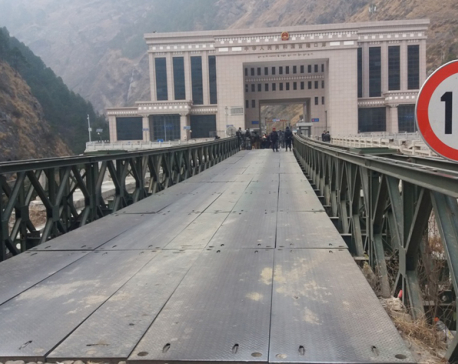
OR
Tourism entrepreneurs pin high hopes on Rasuwagadhi border crossing
Published On: September 25, 2017 08:25 AM NPT By: Arpana Ale Magar
KATHMANDU, Sept 25: Tourism entrepreneurs are hoping to cater to more tourists visiting Kailash Mansarovar area in Tibet Autonomous Region of China via Nepal, following the recent announcement to open the Rasuwagadhi border point as an international crossing point.
They are already planning to offer a range of attractive travel packages to not only Nepali and Indian tourists, but also to other foreign tourists who take the Nepal route to visit Kailash Mansarovar.
Recognizing Rasuwagadhi as a potential trade route between Nepal and Tibet Autonomous Region of China, the two countries jointly decided to open it as an international crossing point on August 28.
Tourism entrepreneurs say that this new route will shorten the time taken for round trip to Kailash Mansarovar from Kathmandu by at least two days. They have also said that opening of this border point could help to promote tourism industry of the country.
However, entrepreneurs said that unstable visa policy of China has been making things difficult for them. “We do not know when China shuts its border for foreigners.
They take decisions without giving us prior information,” Karna Lama, general secretary of Trekking Agencies’ Association Nepal (TAAN), said. “It is creating big problem for entrepreneurs.”
Welcoming the decision to open the border point for foreigners, Lama said that shorter distance could help to increase the number of tourists from visiting Tibet from Nepal. “Not only entrepreneurs, tourists, especially pilgrims, will benefit from this decision,” Lama said.
He also requested the government to needful diplomatic initiative toward sudden closing of border by the Chinese side citing national and security reasons.
“We have been drawing the attention of the Ministry of Foreign Affairs toward this issue,” he said, adding: “The Chinese side should at least give us prior information so that entrepreneurs can organize travel programs accordingly.”
Prashant Pokharel, a travel consultant, said that the opening of new entry point will ease pressure on Tatopani and Simikot routes. “Tourists so far have been using two routes to travel to Tibet -- Simikot and direct flight to Lhasa. Another route, Tatopani, has been closed after the earthquakes of 2015,” he said, adding: “The Rasuwagadhi route will not only reduce distance but also cost.”
He also said that the new route will benefit travelers who want to enter Tibet via land route. “As China has closed the Nathu La point near Sikkim, the opening of the new route could benefit us hugely,” he added. “Around 40 percent of the visitors heading to Tibet could sue the new route.”
He, however, said that the government should upgrade road to Rasuwagadhi and build infrastructure to facilitate tourists.
China is building needful infrastructure on its side to develop Rasuwagadhi-Kerung border as its major trading point with Nepal.
You May Like This

No vehicular movement on Rasuwagadhi border before Aug 16
RASUWA, Aug 4: Vehicular movement at Rasuwagadhi, the international business border with China has been halted for the month of... Read More...

China closes Rasuwagadhi border for six days
RASUWA, Oct 18: China has closed the Rasuwagadhi border crossing -- the only trade border between Nepal and China - for... Read More...







Just In
- NRB to provide collateral-free loans to foreign employment seekers
- NEB to publish Grade 12 results next week
- Body handover begins; Relatives remain dissatisfied with insurance, compensation amount
- NC defers its plan to join Koshi govt
- NRB to review microfinance loan interest rate
- 134 dead in floods and landslides since onset of monsoon this year
- Mahakali Irrigation Project sees only 22 percent physical progress in 18 years
- Singapore now holds world's most powerful passport; Nepal stays at 98th











Leave A Comment